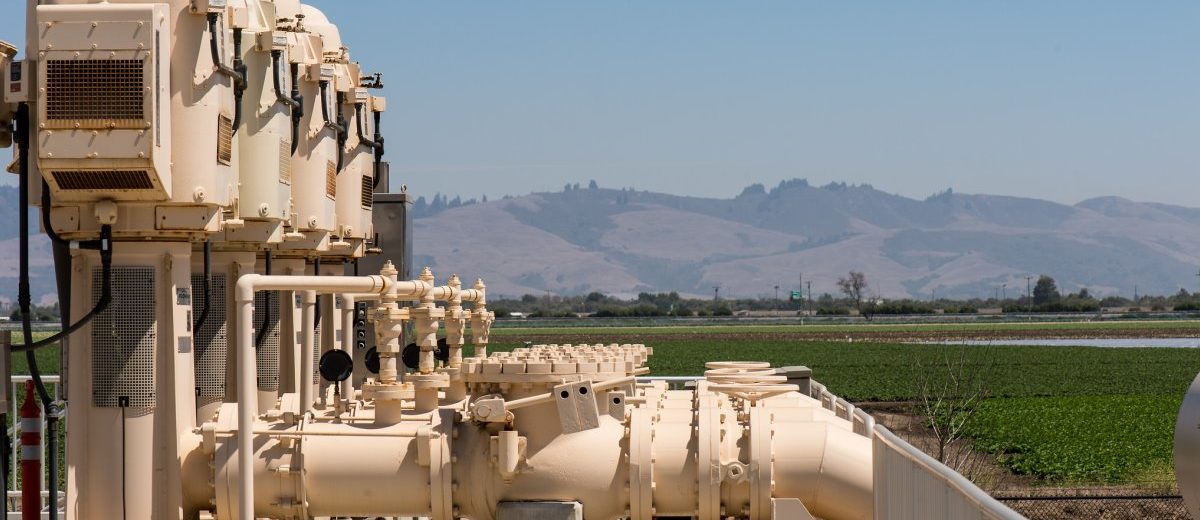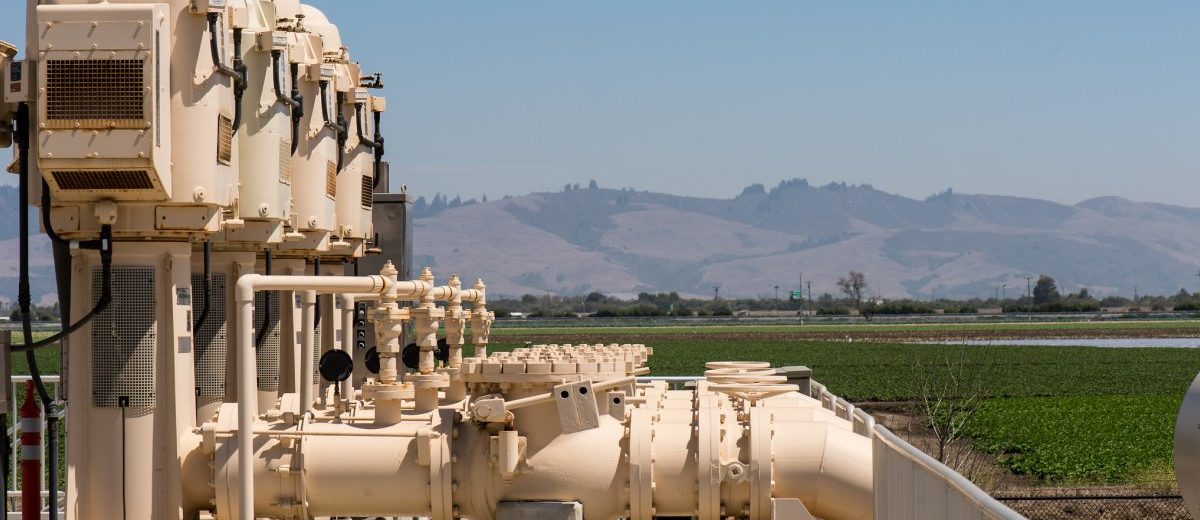 A water market is much like a stock market for water, but instead of trading stocks and bonds, sellers in water markets offer short- or long-term transfers of water. In some cases, sellers may sell water rights permanently.
A water market is much like a stock market for water, but instead of trading stocks and bonds, sellers in water markets offer short- or long-term transfers of water. In some cases, sellers may sell water rights permanently.
California has had a relatively active water market since the 1980’s with the majority of water transfers occurring with the same county or region. Despite significant growth in the number of water transfers in the 1990’s, the number of water transfer has remained largely stable with approximately 1.2 maf/year in transfers since 2000.
Water trading can be an effective tool for water managers to provide flexibility in the allocation and use of water by moving water to where it is needed most, especially during times of drought. Water transfers can also help accommodate shifts in water demand over the long-term. Transfers, however, must be carried out in a responsible manner in order to assure that they do not result in adverse impacts to other water users or unreasonable impacts on the environment.
The benefits of a water market can only be realized if the market is managed effectively. An effective water market needs to have clear and established water rights, the ability to make transactions related to those water rights, and access to relevant market information.
Key information
Trading Sustainably: Critical Considerations for Local Groundwater Markets Under the Sustainable Groundwater Management Act
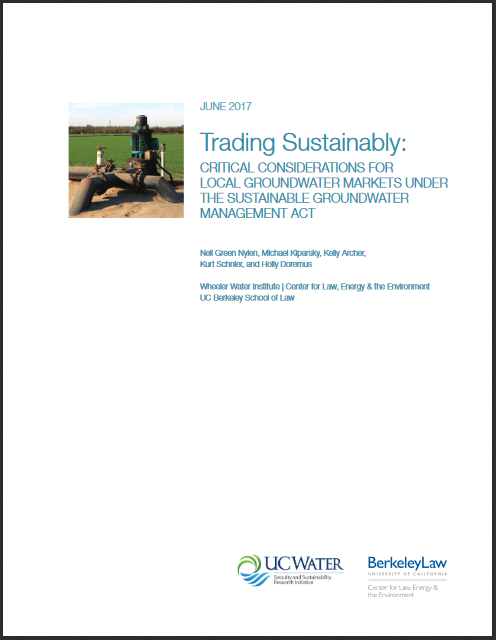 California’s Sustainable Groundwater Management Act potentially opens the door for local groundwater markets. However, it does not provide guidance about when such markets might be useful and appropriate management tools.
California’s Sustainable Groundwater Management Act potentially opens the door for local groundwater markets. However, it does not provide guidance about when such markets might be useful and appropriate management tools.
This report outlines a set of considerations designed to help decision-makers and stakeholders evaluate whether and under what conditions a local groundwater market might be a viable tool that contributes to sustainably managing a particular groundwater basin.
Groundwater Trading as a Tool for Implementing California’s Sustainable Groundwater Management Act
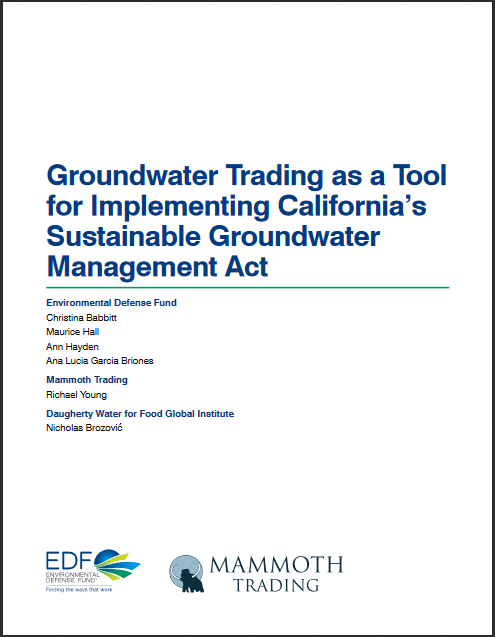 To meet the requirements of SGMA, GSAs will need to employ a wide range of management tools. This paper focuses on one set of these tools: groundwater trading programs. Trading goes by many different names, including markets, cap and trade, transfers, credit programs, banking, pooling, and exchanges.
To meet the requirements of SGMA, GSAs will need to employ a wide range of management tools. This paper focuses on one set of these tools: groundwater trading programs. Trading goes by many different names, including markets, cap and trade, transfers, credit programs, banking, pooling, and exchanges.
For the purposes of this paper, we have elected to use the terms “trading” and “trading programs” as the broader categorization of incentive-based management tools. Trading can be executed through a wide range of exchange vehicles, including short- and long-term leases, permanent transfers, and other more advanced or unique arrangements, such as inter-annual water exchanges or dry-year options contracts.
Groundwater Markets: Recommendations to Ensure Drinking Water Protections for Communities
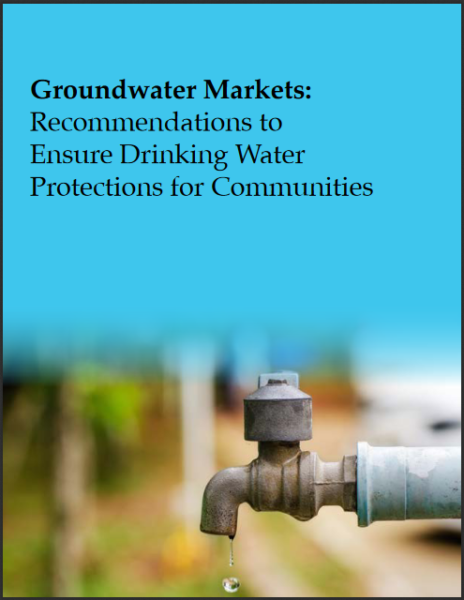 SGMA is likely to result in significant changes in historical pumping patterns through the many management actions and projects that will be implemented over the next 20 and more years. One potential management action and project, and focus of this white paper, is to develop a system to trade groundwater pumping allocations.
SGMA is likely to result in significant changes in historical pumping patterns through the many management actions and projects that will be implemented over the next 20 and more years. One potential management action and project, and focus of this white paper, is to develop a system to trade groundwater pumping allocations.
Though the trading or transfer of surface water is a fairly common practice, trading groundwater is a newer endeavor in California that requires the development of thoughtful frameworks and rules to ensure that all groundwater-dependent communities are protected.
The purpose of this white paper is to:
1. Provide an overview of some of the major elements to consider when developing a well-designed groundwater market.
2. Introduce tools to help community stakeholders engage in the market design and implementation process.
3. Hold decision makers accountable in developing groundwater management strategies that are protective of community needs.
This white paper prioritizes key recommendations for the protection of drinking water sources where groundwater markets are adopted.
Groundwater market resources
From the Nature Conservancy:
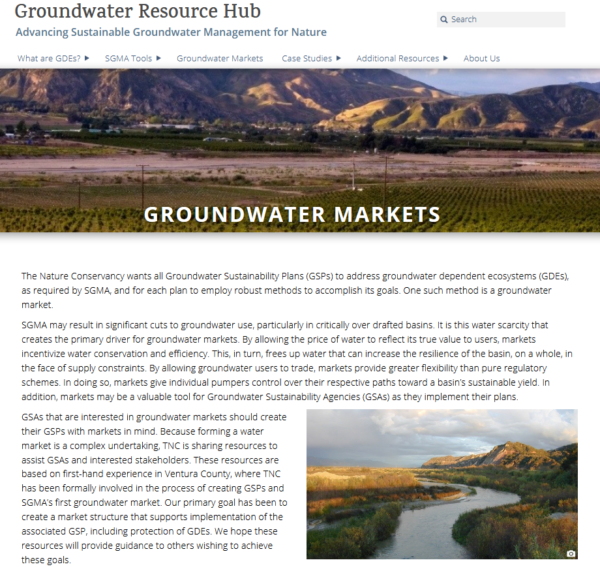 GSAs that are interested in groundwater markets should create their GSPs with markets in mind. Because forming a water market is a complex undertaking, TNC is sharing resources to assist GSAs and interested stakeholders. These resources are based on first-hand experience in Ventura County, where TNC has been formally involved in the process of creating GSPs and SGMA’s first groundwater market.
GSAs that are interested in groundwater markets should create their GSPs with markets in mind. Because forming a water market is a complex undertaking, TNC is sharing resources to assist GSAs and interested stakeholders. These resources are based on first-hand experience in Ventura County, where TNC has been formally involved in the process of creating GSPs and SGMA’s first groundwater market.
Our primary goal has been to create a market structure that supports implementation of the associated GSP, including protection of GDEs. We hope these resources will provide guidance to others wishing to achieve these goals.
Resource: The Groundwater Game
 The Groundwater Game provides players with an interactive opportunity to experience the challenges of managing increasingly scarce groundwater when there are competing needs. The game also provides players with a greater understanding of different management tools, including groundwater trading.
The Groundwater Game provides players with an interactive opportunity to experience the challenges of managing increasingly scarce groundwater when there are competing needs. The game also provides players with a greater understanding of different management tools, including groundwater trading.
Agency requirements for water transfers
Depending upon the source of the water to be transferred, approvals by state and/or federal agencies may be required. Water transfers that require the use of State, regional, or a local public agency’s conveyance facilities require the owner of the conveyance facilities to determine that the transfers will not harm any other legal user of water, will not unreasonably affect fish and wildlife, and will not unreasonably affect the overall economy of the county from which the water is transferred.
Water market articles at Maven’s Notebook
- Notebook water market posts

Explore water markets at the California Water Library
{{ document.post_title }}
{{ document.publisher }} | {{ document.document_date }}
{{ document.post_content_short }}

